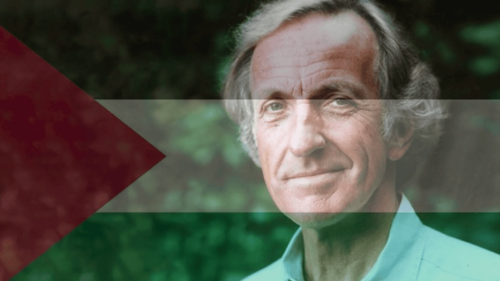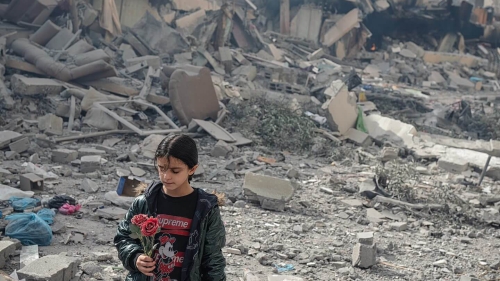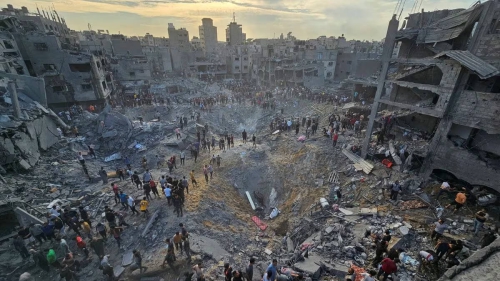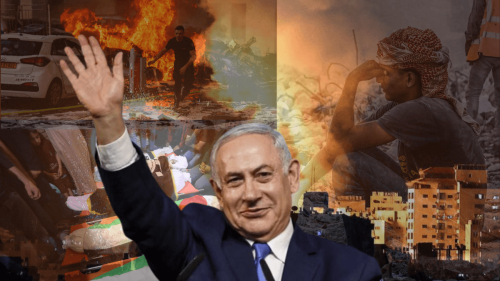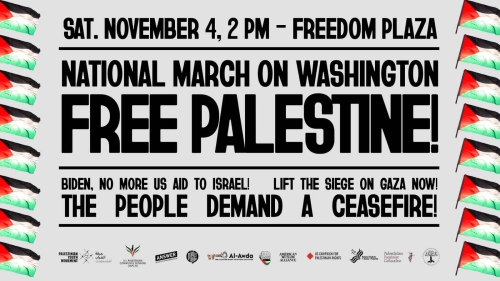By Starting Now, Arab Americans and Muslim Americans Can Make Election Year 2000 a Turning Point
First published in the SEPTEMBER 1999 issue of Washington Report on Middle East Affairs. Reprinted with permission.
The first years of new administrations have traditionally seen U.S. peace initiatives in the Middle East. Re-election time is still three years away...The president and his advisers will soon learn that the domestic price is too high to pay. An organized, articulate, and vocal interest group operating in America's democratic can cause the executive branch of government a lot of headaches if aroused."
Jerusalem Post, Oct. 11, 1977.
The excerpt above from a 1977 Jerusalem Post article advises Israeli readers not to worry too much about the zeal of newly elected U.S. President Jimmy Carter to settle the Israeli-Arab dispute because the American Jewish community, directed by Israel's Washington, DC lobby, can cause his administration "a lot of headaches." Note its description of that community as "an organized, articulate and vocal interest group." Those words are a challenge to American Muslims.
But then note, also, that American Muslims do not want to cause U.S. administrations "headaches" in foreign policy. Instead they want to free U.S. presidents and members of Congress to support traditional American concerns for human rights, self-determination and fair play.
The reason the U.S. is not following even-handed policies in Palestine, Lebanon, Syria or Kashmir is the influence of Israel's principal lobby in Washington, DC, the American Israel Public Affairs Committee (AIPAC). AIPAC has molded the 52 groups represented in the Council of Presidents of Major American Jewish Organizations into just such an "organized, articulate and vocal interest."
The challenge to America's Islamic community and to Christian Arab Amercans, therefore, is to offset that interest group, freeing U.S. policymakers to pursue U.S, national interests, which call for stability in international relations around the globe, and productive and friendly relations with all of the countries of the Islamic world.
Some U.S. Muslims say that in seeking to ease the entrance into American life of their -religionists, whose basic interest is to raise and educate their children in accordance with the principles of Islam while living in harmony with their fellow Americans, the last thing they should do is antagonize the Israel lobby. In fact, the leader of one of the established Arab-American groups recommended this year that in entering the U.S. political system Arab Americans would be well advised to avoid the Palestinian issue. Similarly, the leader a new, fringe Islamic group in the U.S. seems to be saying the same thing.
The Israel lobby sees American Muslims as the most serious threat to Israel's hold on U.S. foreign policy. So far as this writer can determine, however, leaders of all of the other Muslim- and Arab-American political organizations disagree with that recommendation. They believe that until the Israel lobby is neutralized, it will be working tirelessly to ensure that neither Muslim Americans nor Arab Americans will be accepted into American political life.
The reason is that the Israel lobby sees American Muslims, whose numbers are growing rapidly through immigration, conversion, and steady birthrates, as the most serious threat to Israel's hold on U.S. foreign policy. This is true because the 6 to 8 million U.S. Muslims, even without the additional 1.5 to 2 million Christian Arab Americans, already outnumber America's five million Jews. And this disparity is growing because the Jewish community has a very low birthrate, a 50 percent intermarriage rate, and because more unaffiliated Jews are dropping out of participation in the Jewish community than are entering it.
Muslims should realize that the United States has absorbed many different ethnic and religious communities in the past, to the benefit both of the country and the communities. Since American Muslims are strictly enjoined by their co-religionists not to discriminate against others, to cooperate with their neighbors for the good of the communities in which they live, and to take care with the upbringing and education of their children, they should have even fewer problems than some of the communities that have preceded them. It is on these matters, not religion or ethnicity, that Americans judge their neighbors.
American Muslim "Problems"
But if these are the requirements for acceptance, why are American Muslims encountering problems that are not being experienced by other groups today? For example, in the aftermath of the Oklahoma City bombing and the accidental crash of TWA Flight 800 off Long Island, self-described "terrorism expert" Steven Emerson, who has close with Israel and pro-Israel institutions in the United States, immediately sought to implicate Muslims, although they had nothing to do with either tragedy.
And, in practice, the secret evidence being used by the Immigration and Naturalization Service in attempts to deport resident aliens is being used almost exclusively against Muslims. Further, the confiscation of assets of an American citizen, based upon secret evidence and an executive order signed by President Clinton, is being used against Mohamad Salam, a Muslim from the Chicago area, apparently based solely upon evidence provided by Israel. So far as this writer knows, no other U.S. citizen is suffering similar persecution by the FBI solely on "secret evidence." And, in general, it has been more difficult to get permits to build mosques and Islamic schools than it is for other religious communities to do the same things.
It seems that whatever Muslims do or don't do, they are targets of an ongoing defamation campaign orchestrated by the Israel lobby in the United States. The principal offender, besides AIPAC, is B'nai B'rith's Anti-Defamation League, which has been caught conducting illegal surveillance and using stolen police files for possible illegal use against private individuals. But other Jewish organizations, notably the Zionist Organization of America, and pro-Israel elements in the mainstream American media also have participated in smear campaigns and other acts of intimidation against Muslims and their allies.
All of these despicable acts are contrary to the traditions of individual American Jews, who in the past have tended to identify with the victims of persecution, not the persecutors. But they are happening because the Israeli government feels that its expansionist policies can be maintained only by driving wedges overseas between the United States and the Islamic countries, and at home between Muslim-Americans and their neighbors. The clear purpose of these tactics is to prevent American Muslims from obtaining political power commensurate with their growing numbers.
So long as the Israeli-Palestinian problem remains unsettled in the Middle East, Islam is going to be slandered, even in otherwise respectable media, in the United States. And there are going to be attempts to make the words "Muslim" and "terrorist" virtually synonymous.
It is therefore futile to address the of civil rights for Muslims in isolation from the problem of the Israel lobby's current disproportionate influence on the U.S. political system. It would be equally simplistic to seek to address the problem of Kashmir in isolation from the Palestine problem, because it is the unofficial alliance between Israel and India that is having such a negative impact on presentation of the Kashmiri case for self-determinition in the U.S. media.
So what should American Muslims be doing in 1999? One thing they already have done is coordinate the efforts of the American Muslim Political Coordination Council (AMPCC) with the Council of Presidents of Arab American Organizations. These two roof organizations for political action groups within both overlapping communities already are working on two projects for the second half of 1999.
They are encouraging all eligible members of their communities to register vote. They also are working with members of Congress to repeal secret evidence provisions in the Anti-Terrorism and Effective Death Penalty act of 1996.
As for the Muslim groups alone, it is not too early for delegations from the AMPCC to be formulating the topics they should discuss with prospective presidential candidates for the 2000 election. In 1996 they made few requests of the Clinton and Dole campaign committees: support Muslim civil rights; acknowledge that the U.S. today has a Judeo-Christian-Islamic heritage; be open to negotiations with all Muslim countries; and support fair and even-handed policies in the Middle East.
At this writing there are eight candidates remaining in the year 2000 race for the Republican presidential nomination, and two candidates competing for the Democratic presidential nomination. Judging from their stands on the Israeli-Palestinian peace process, Muslims who are registered Democrats are more likely to support Bill Bradley than Al Gore, and Muslims who are registered Republicans are more likely to support George W. Bush, Elizabeth Dole, Pat Buchanan or Lamar Alexander than Gary Bauer, Steve Forbes, Alan Keyes or John McCain.
Nevertheless, it would be prudent for AMPCC delegations to begin seeking appointments with every one of the candidates. The visit would acquaint the candidates and their campaign directors with the huge Muslim presence in such key electoral states as California, Illinois, Michigan, New Jersey, New York, Virginia and Florida. And it would enable Muslims to present their concerns to the candidates, and then to assess what effect the meetings have had on their campaign rhetoric.
In arranging the meetings, the Muslim leaders must remind themselves that the object is not to try to pick a winner, but to try to pick the best qualified by Islamic standards to recommend to Muslim voters. It is the candidate, not the community, that is on trial.
Out of this activity should emerge a recommended Democratic and a recommended Republican nominee by the end of the year. Because of the early dates of the key presidential primary elections, the party nominations probably will have been decided by the end of March 2000. If Muslims are to have a role in this nominating process, they must start preparations this summer to select one recommended candidate from each party.
There is no need yet to choose one party over the other. That can wait until each party has finally selected its nominee. Then it will be time for another visit by Muslim leaders to each of the two remaining nominees before a final joint recommendation is made for the November 2000 presidential election.
There is one other caution. There are Muslims who already are Republican or Democratic activists. Hopefully they are working from inside for changes in the respective party platforms to attract the Muslim vote. That's good.
But after listening to the arguments of Muslim activists in both parties, it is essential that Muslim leaders who are not tied to either party make the final recommendation for a bloc vote.
If Muslim leaders demonstrate that they can turn out the entire community to vote, and that they are unified enough to agree on a recommendation when one candidate clearly is better qualified than another when judged by Islamic criteria, they will put the Islamic community indelibly on the American political map, and thus take a step toward neutralizing the lobby that would like to keep Muslim and Arab Americans on the margins.
The best way for American Muslims who want to support their leaders and participate personally in this historic effort is to affiliate with at least one of the four national groups comprising the AMPCC. These are the American Muslim Alliance (AMA), American Muslim Council (AMC), Council for American-Islamic Relations (CAIR), and Muslim Public Affairs Council (MPAC).
Richard H. Curtiss is the executive editor of the Washington Report
Topics: Israel Lobby In The United States, Occupation, Washington - D.c.
Views: 1131
Related Suggestions








